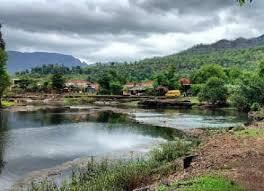KPSC KAS (Karnataka) Exam > KPSC KAS (Karnataka) Notes > KPSC KAS Preparation: All subjects > Karnataka: Climate
Karnataka: Climate | KPSC KAS Preparation: All subjects - KPSC KAS (Karnataka) PDF Download
Introduction
The climate of Karnataka is shaped by its geographical location, diverse topography, and the influence of the Arabian Sea and the Bay of Bengal. This results in a varied climate with distinct seasons.

Tropical Monsoon Climate
- Karnataka experiences a tropical monsoon climate, common to many regions in southern India.
- The state undergoes a pronounced separation between the wet and dry seasons, largely influenced by the seasonal monsoon winds.
Summer (March to May)
- During the summer months, Karnataka faces intense heat due to its inland location.
- This period is characterized by high temperatures and dry weather conditions, impacting agriculture and daily life.
- Regions like Raichur and Gulbarga often record temperatures exceeding 40°C, affecting activities and necessitating precautions against heat-related illnesses.
South-West Monsoon (June to September)
- The onset of the monsoon brings relief from the scorching heat, with Karnataka receiving a significant portion of its annual rainfall during this period.
- Coastal areas like Mangalore and Karwar experience heavy rainfall, vital for agriculture and water resources.
North-East Monsoon (October to December)
- This season witnesses rainfall primarily in the northern parts of Karnataka, aiding in the cultivation of Rabi crops.
- Regions such as Bidar and Belgaum benefit from this rainfall for agricultural purposes.
Winter (January to February)
- The winter months bring cooler temperatures, especially in regions like Chikmagalur and Kodagu, known for their coffee plantations.
- Chilly mornings and pleasant days characterize this season, attracting tourists to hill stations like Coorg for a relaxing getaway.
Influence of Topography on Climate
- Karnataka's climate is shaped by its diverse landscape, which includes coastal regions, plains, hills, and plateaus.
- The Western Ghats, located in the western part of the state, receive substantial rainfall, contributing to their ecological richness and supporting several key rivers.
Impact on Economy and Tourism
- The climate in Karnataka significantly influences the state's economy, particularly in agriculture, which is a major contributor to the state's GDP.
- The varied climate also enhances Karnataka's appeal as a tourist destination, offering a range of experiences from coastal beaches to picturesque hill stations.
Koeppen Climate Classification
Karnataka's climate can be broadly classified into two main types according to the Koppen climate classification: Tropical Monsoon Climate (Am) and Tropical Savanna Climate (Aw).
Tropical Monsoon Climate (Am)
- This climate type dominates most parts of Karnataka, including coastal areas and the Western Ghats.
- The Am climate features high temperatures throughout the year, along with distinct wet and dry seasons.
- Summers (March to May) are hot and dry, with temperatures ranging from 30°C to 40°C (86°F to 104°F) across much of the state.
- The monsoon season (June to September) brings heavy rainfall, especially to coastal areas like Mangalore.
- Winters (December to February) are mild and pleasant, with daytime temperatures ranging from 15°C to 30°C (59°F to 86°F).
Tropical Savanna Climate (Aw)
- The Aw climate is found in certain inland areas of Karnataka, particularly in the northern regions, including cities like Bellary and Gulbarga.
- This climate type shares characteristics with the Am climate, including hot and dry summers and a distinct wet and dry season.
- Summers in the Aw region are extremely hot, with temperatures often exceeding 40°C (104°F) and sometimes reaching up to 45°C (113°F) or higher.
- The monsoon season provides some rainfall, but it is generally less compared to the coastal and Western Ghats regions.
- Winters are cooler than the scorching summers, with temperatures ranging from 15°C to 30°C (59°F to 86°F) during the day.
Geographical Influences
- Karnataka’s climate is shaped by its geographical location, varied topography, and the influence of the Arabian Sea and the Bay of Bengal.
- The Western Ghats, located in the western part of the state, play a crucial role in influencing rainfall patterns, contributing to the Am climate in these regions.
- In contrast, the northern regions and inland areas, which experience the Aw climate, have lower rainfall and higher temperatures during summer.
Impact on Agriculture, Economy, and Tourism
- The climate of Karnataka has a significant impact on the state's agriculture, economy, and the way of life for its residents.
- The diverse climate also enhances Karnataka's appeal as a tourist destination, offering a range of experiences from coastal beaches to scenic hill stations, wildlife sanctuaries, and historic monuments.
The document Karnataka: Climate | KPSC KAS Preparation: All subjects - KPSC KAS (Karnataka) is a part of the KPSC KAS (Karnataka) Course KPSC KAS Preparation: All subjects.
All you need of KPSC KAS (Karnataka) at this link: KPSC KAS (Karnataka)
|
82 videos|83 docs
|
Related Searches















